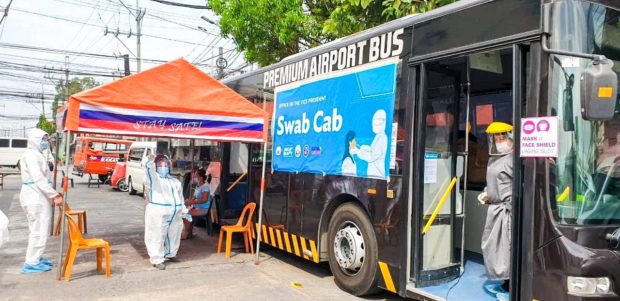
Day 2 of the Swab Cab initiative of the Office of the Vice President in Malabon City. Image from the Facebook page of VP Leni Robredo
MANILA, Philippines — Vice President Leni Robredo revealed that their Swab Cab initiative — where COVID-19 testing is brought to the communities — encountered a problem when only a few people lined up for testing in Malabon, their pilot area.
Because of that, they devised a simple plan that would target the biggest fears of people who might end up positive: food security.
Robredo shared during an interview with ABS-CBN News Channel on Friday that they gave free rice grains to anyone who would submit themselves to COVID-19 testing, as the country grapples with an upsurge in cases.
“A lot of those identified by the LGUs didn’t want to be swabbed. Most of them were afraid that, you know, if they test positive, they will be put to isolation centers and if they are brought to the isolation centers, they won’t be able to work. So if they won’t be able to work, walang kakainin iyong pamilya. Ang iba naman, may inaalagaan na anak,” the Vice President said.
“We were only able to swab, I think, a little over 500. Noong bumalik kami noong Tuesday […] mayroon na kaming incentives. Mayroon na kaming incentives na for every person na magpapa-swab, nagbigay kami ng bigas,” she added.
(When we came back this Tuesday, we already brought incentives. We have incentives for every person who would have themselves swabbed, we gave out rice.)
The Office of the Vice President (OVP) is also offering to provide food packages as incentive for those who would later test positive.
“Iba pa iyong package sa nag-positive. Sa nag-positive mas marami. It’s an entire package na para to assure the person who tested positive na may kakainin iyong pamilya niya habang nasa isolation scenter siya. So iyon iyong unang… iyon iyong unang lesson,” Robredo said.
(A different package is given to positive patients. More items are given to those who test positive. It’s an entire package to assure the person who tested positive that his or her family would have something to eat while he or she is in isolation. So that’s the first lesson.)
The Swab Cab initiative was launched by OVP with help from its private sector partners, as it intends to augment the government’s testing capacity amid a surge of cases. Malabon was the first city that OVP went to, and Robredo revealed that their next stop maybe in Marikina.
The latest surge, which has seen COVID-19 cases increase daily by over 10,000 cases on several instances, has been blamed on the spread of more infectious variants of concern.
Active cases as of Friday is now at 178,351 due to a record-high increase of 12,225 new cases, while deaths are at 14,520 with 401 new deaths.
Robredo also revealed that they also made isolation centers better so that people being quarantined would feel better and more comfortable.
According to the Vice President, 80 out of the over 1,300 tests done came out positive.
“Iyong pangalawang lesson, iyong quality ng isolation center. Kasi marami rin iyong tao na ayaw magpa-swab kasi hindi komportable. Kasi hindi komportable doon sa isolation center. So the first day that we were swabbing, nagse-set up din kami ng isolation center,” Robredo said.
(The second lesson, is about the quality of the isolation center. Because a lot of people do not want to be tested because they are not comfortable, they are not at ease with the isolation center. So on the first day that we were swabbing, we already set up isolation centers.)
“And ito na lang, LGU Malabon has been very, very cooperative. Mayroong isang paaralan doon na buti na lang pinahiram ng LGU Malabon, we converted that into tents para may privacy iyong bawat isa, inayos namin iyong mga banyo, nilagyan namin iyong mga facilities,” she added.
(And also, the local government unit of Malabon has been very cooperative. One school in the city was opened for use by the local government, we converted that into tents so that every patient has his or her privacy, we fixed the comfort rooms, we placed facilities needed.)
Last Tuesday, OVP sent out photos showing the Swab Cab continuing its operations in Malabon, especially in densely-populated communities that may hold conditions for community transmissions.